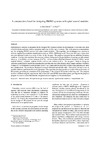Identificador persistente para citar o vincular este elemento:
https://accedacris.ulpgc.es/jspui/handle/10553/41561
| Título: | A computational tool for designing BWRO systems with spiral wound modules | Autores/as: | Ruiz-García, Alejandro De La Nuez Pestana, Ignacio |
Clasificación UNESCO: | 3308 Ingeniería y tecnología del medio ambiente 330806 Regeneración del agua |
Palabras clave: | Brackish water RO system design Reverse osmosis Spiral-wound modules Computational tool |
Fecha de publicación: | 2018 | Publicación seriada: | Desalination (Amsterdam) | Resumen: | Deficiencies in commercial programs for the design of RO systems motivate the development of new ones that allow a flexible design and more realistic operating conditions for this type of systems. This work presents a computational tool for designing BWRO systems with spiral-wound modules. This algorithm has advantages over commercial software supplied by membrane manufacturers (such as ROSA, IMSDesign or Q(+) Projection Software), whose trial-and-error approach results in a waste of time for the designer. The proposed program has an additional boundary condition: to achieve the maximum flux recovery without scaling due to the precipitation of sparingly soluble mineral salts (e.g., silica (SiO2), calcium carbonate (CaCO3), calcium sulphate dihydrate (denoted simply as CaSO4), barium sulphate (BaSO4), strontium sulphate (SrSO4) and calcium fluoride (CaF2)). The designer's liberty to change the constrains established by membrane manufacturers provides the user with a desired safety margin and more flexibility. A range of 1 to 8 elements in each pressure vessel, 1 to 3 stages and the possibility of inter-stage pumping are taken into consideration. The results are displayed in a multi-filterable and sortable table. This allows the user to see all possible solutions and choose the most appropriate. The algorithm also has a predictive model of the performance of RO systems, providing an estimation of the performance of the selected RO system in the long term. The program has been validated using the experimental data of four full-scale BWRO desalination plants, proving that the proposed program is closer to actual data than the computational tool supplied by the manufacturer. | URI: | https://accedacris.ulpgc.es/handle/10553/41561 | ISSN: | 0011-9164 | DOI: | 10.1016/j.desal.2017.10.040 | Fuente: | Desalination [ISSN 0011-9164], v. 426, p. 69-77 |
| Colección: | Artículos |
Citas SCOPUSTM
45
actualizado el 08-jun-2025
Citas de WEB OF SCIENCETM
Citations
48
actualizado el 22-feb-2026
Visitas
196
actualizado el 15-ene-2026
Descargas
1.073
actualizado el 15-ene-2026
Google ScholarTM
Verifica
Altmetric
Comparte
Exporta metadatos
Los elementos en ULPGC accedaCRIS están protegidos por derechos de autor con todos los derechos reservados, a menos que se indique lo contrario.
